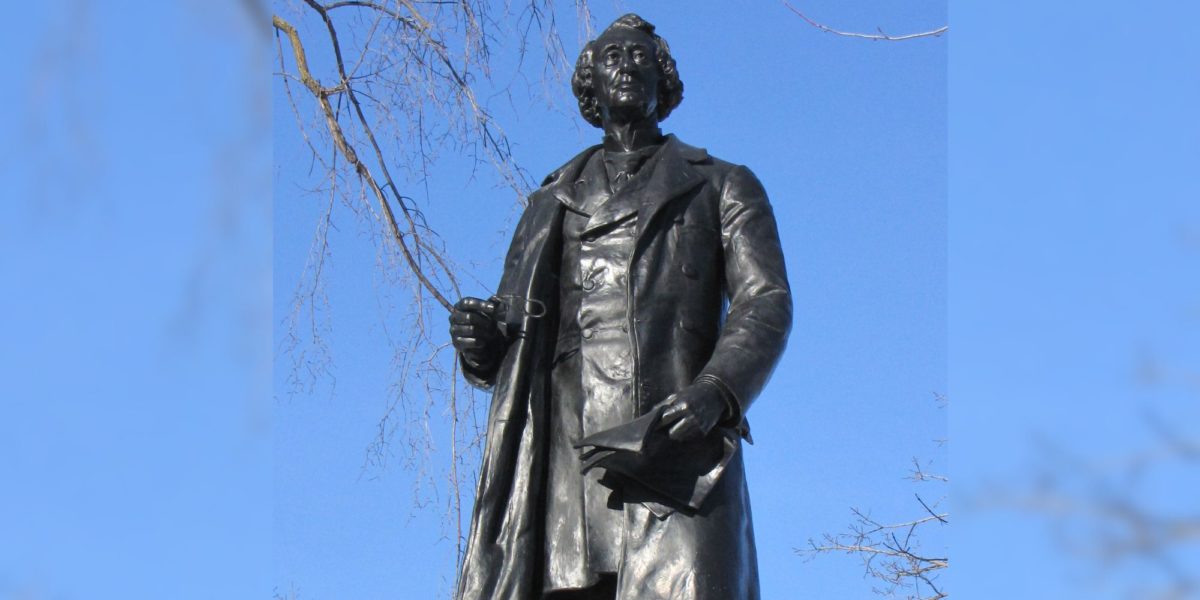On January 24, The Globe and Mail published a piece by John Ibbitson arguing in defense of Canada’s so-called ‘father of Confederation,’ Sir John A. Macdonald. In the piece, Ibbitson goes on to argue a defence of Canada itself, engaging in genocide apologia by asserting that Canada has done good in the world – indeed, that Canada is good in the world – and thus we should be grateful for its existence.
Regarding Macdonald, Ibbitson’s main point is that Sir John A. does not deserve particular condemnation; “Injustice toward Indigenous peoples long predated Confederation and continues to this day. The record of racism toward non-European immigrants is lengthy and sordid. What makes Macdonald more culpable than the rest?”
About Canada, though, Ibbitson argues that this country is uniquely worthy of celebration.
“But Macdonald and a handful of others also gave us Canada. They crafted a dominion unique in its balance of powers between federal and provincial, English and French. Immigrants from Britain and Eastern Europe came here. Italians and Portuguese and Chinese and South Asians and Filipinos came here. Muslims and Jews came here. Refugees came here, the latest from Afghanistan and Ukraine.
Canada is far from perfect, but it is arguably the least imperfect country on Earth, if the embrace of diversity is your measure.”
This is an incoherent sentiment, to say the least. Canada is a Eurocolonial project, a site of ongoing genocide of Indigenous peoples facilitating a predominantly European/white settler-colonial state. The fact that Europeans from various countries have settled in Canada is not set apart or against the argument that Canada is evidence of genocide – it is the very same thing. They are the settlers, not something else.
Further, immigrants and refugees who have come to Canada from elsewhere in the world are, in many cases, leaving other sites or consequences of Eurocolonial violence and structural, global white supremacy. Again, these are not effective arguments that the Eurocolonial violence and white supremacy which created and maintains Canada was or is justified, they are just further examples of the same thing. Ibbitson also conspicuously omits less flattering aspects of Canada’s global record and foreign policy. Canada has among the highest per-capita carbon emissions in the world, and the government touts being a destination for the global mining industry’s corporate headquarters. The day after UN Secretary-general António Guterres declared investing in new fossil fuel projects to be “moral and economic madness,” Canada approved its largest-ever offshore drilling project. The scale of Canada’s disproportionate contributions to climate change and global ecological devastation is shocking, and greatly deepens Canada’s role in propagating Eurocolonial violence and inequity throughout the world. This, before you even consider Canadian arms sales, support for medical IP restrictions, participation in imperialist foreign interference, and military support for war crimes and apartheid. None of this appears to enter Ibbitson’s analysis.
Ibbitson goes on to write a damningly revealing statement;
“The answer could be that, as the first prime minister and a Father of Confederation, Macdonald personifies Canada. In pulling down his statue, some people are not simply protesting the legacy of residential schools – they are pulling down the symbol of an oppressive, colonizing state.
In that sense, to pull down a Macdonald statue is to pull down the statue of every prime minister and every leader who contributed to oppression of Indigenous peoples. And given what they’ve been put through, who could blame them?”
In my view, this demonstrates the ultimate point. Ibbitson is unwilling or unable to conceive of a world that is not both product of and structurally propagating white supremacy. This world, the one we see when we look around us, bears a history, centuries-long, of Europeans enslaving, murdering, mutilating, robbing, raping, displacing, and violently dehumanizing as many other people in the world as they could while enriching themselves. Millions upon millions upon millions of people, for centuries. Accounts of the treatment of enslaved people are shocking and sickening to a degree words simply cannot express. From his writing here, it appears that Ibbitson does not fundamentally object to these events. He claims to understand why Indigenous peoples may oppose Canada itself, but does not consider for a moment that this history presents a reason he should oppose Canada. The implication Ibbitson offers is; slavery, colonization, genocide, centuries of global racist inequity – it’s all to his benefit, so he takes no issue with it. “And given what they’ve been put through, who could blame them?”
Sir John A. Macdonald was an overt white supremacist. Macdonald authorized the creation of the residential school system, a structure explicitly intended to eradicate Indigenous cultures, knowledge, and ways of being. In implementing legislation to prohibit Chinese immigrants to Canada from voting, in addition to them being subject to a racist ‘head tax’, Macdonald argued a need to maintain “Aryan” character and European dominance in Canada. He should be specifically condemned, whether or not to a greater degree than his contemporary slavers and colonizers. (A common response to such points – “everyone thought that way at the time!” – eagerly forgets that people who aren’t European are indeed human, and did not agree.)
Ibbitson says that we should be cautious in our condemnation, because John A. Macdonald is part of who we are. Naturally this begs the question; who is “we”? The vast majority of people in the world have immediate and familial reasons to reject Eurocoloniality, to speak and act against a world built on and invested in maintaining centuries of horrific white supremacy. Ibbitson, however, does not see this as a call for solidarity. He motions toward some understanding of why a colonized people would reject the colonial state, but he displays no revulsion toward it himself.
Ibbitson claims that Sir John A. Macdonald gave us Canada, and we should be grateful for that. To me, it seems what he means is that Macdonald gave him Canada, and he wants to keep it.



